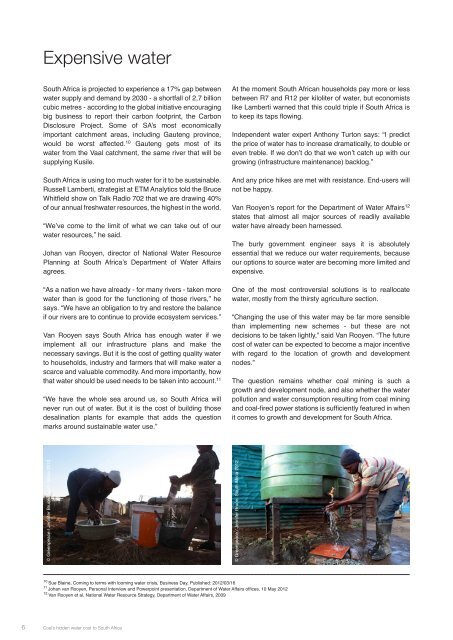Coal's hidden water cost to South Africa - Greenpeace
Coal's hidden water cost to South Africa - Greenpeace
Coal's hidden water cost to South Africa - Greenpeace
You also want an ePaper? Increase the reach of your titles
YUMPU automatically turns print PDFs into web optimized ePapers that Google loves.
Expensive <strong>water</strong><br />
<strong>South</strong> <strong>Africa</strong> is projected <strong>to</strong> experience a 17% gap between<br />
<strong>water</strong> supply and demand by 2030 - a shortfall of 2,7 billion<br />
cubic metres - according <strong>to</strong> the global initiative encouraging<br />
big business <strong>to</strong> report their carbon footprint, the Carbon<br />
Disclosure Project. Some of SA’s most economically<br />
important catchment areas, including Gauteng province,<br />
would be worst affected. 10 Gauteng gets most of its<br />
<strong>water</strong> from the Vaal catchment, the same river that will be<br />
supplying Kusile.<br />
<strong>South</strong> <strong>Africa</strong> is using <strong>to</strong>o much <strong>water</strong> for it <strong>to</strong> be sustainable.<br />
Russell Lamberti, strategist at ETM Analytics <strong>to</strong>ld the Bruce<br />
Whitfield show on Talk Radio 702 that we are drawing 40%<br />
of our annual fresh<strong>water</strong> resources, the highest in the world.<br />
“We’ve come <strong>to</strong> the limit of what we can take out of our<br />
<strong>water</strong> resources,” he said.<br />
Johan van Rooyen, direc<strong>to</strong>r of National Water Resource<br />
Planning at <strong>South</strong> <strong>Africa</strong>’s Department of Water Affairs<br />
agrees.<br />
“As a nation we have already - for many rivers - taken more<br />
<strong>water</strong> than is good for the functioning of those rivers,” he<br />
says. “We have an obligation <strong>to</strong> try and res<strong>to</strong>re the balance<br />
if our rivers are <strong>to</strong> continue <strong>to</strong> provide ecosystem services.”<br />
Van Rooyen says <strong>South</strong> <strong>Africa</strong> has enough <strong>water</strong> if we<br />
implement all our infrastructure plans and make the<br />
necessary savings. But it is the <strong>cost</strong> of getting quality <strong>water</strong><br />
<strong>to</strong> households, industry and farmers that will make <strong>water</strong> a<br />
scarce and valuable commodity. And more importantly, how<br />
that <strong>water</strong> should be used needs <strong>to</strong> be taken in<strong>to</strong> account. 11<br />
“We have the whole sea around us, so <strong>South</strong> <strong>Africa</strong> will<br />
never run out of <strong>water</strong>. But it is the <strong>cost</strong> of building those<br />
desalination plants for example that adds the question<br />
marks around sustainable <strong>water</strong> use.”<br />
© <strong>Greenpeace</strong> / Jennifer Bruce. <strong>South</strong> <strong>Africa</strong> 2012.<br />
10 Sue Blaine, Coming <strong>to</strong> terms with looming <strong>water</strong> crisis, Business Day, Published: 2012/03/16<br />
11 Johan van Rooyen, Personal Interview and Powerpoint presentation, Department of Water Affairs offices, 10 May 2012<br />
12 Van Rooyen et al, National Water Resource Strategy, Department of Water Affairs, 2009<br />
6 Coal’s <strong>hidden</strong> <strong>water</strong> <strong>cost</strong> <strong>to</strong> <strong>South</strong> <strong>Africa</strong><br />
At the moment <strong>South</strong> <strong>Africa</strong>n households pay more or less<br />
between R7 and R12 per kiloliter of <strong>water</strong>, but economists<br />
like Lamberti warned that this could triple if <strong>South</strong> <strong>Africa</strong> is<br />
<strong>to</strong> keep its taps flowing.<br />
Independent <strong>water</strong> expert Anthony Tur<strong>to</strong>n says: “I predict<br />
the price of <strong>water</strong> has <strong>to</strong> increase dramatically, <strong>to</strong> double or<br />
even treble. If we don’t do that we won’t catch up with our<br />
growing (infrastructure maintenance) backlog.”<br />
And any price hikes are met with resistance. End-users will<br />
not be happy.<br />
Van Rooyen’s report for the Department of Water Affairs 12<br />
states that almost all major sources of readily available<br />
<strong>water</strong> have already been harnessed.<br />
The burly government engineer says it is absolutely<br />
essential that we reduce our <strong>water</strong> requirements, because<br />
our options <strong>to</strong> source <strong>water</strong> are becoming more limited and<br />
expensive.<br />
One of the most controversial solutions is <strong>to</strong> reallocate<br />
<strong>water</strong>, mostly from the thirsty agriculture section.<br />
“Changing the use of this <strong>water</strong> may be far more sensible<br />
than implementing new schemes - but these are not<br />
decisions <strong>to</strong> be taken lightly,” said Van Rooyen. “The future<br />
<strong>cost</strong> of <strong>water</strong> can be expected <strong>to</strong> become a major incentive<br />
with regard <strong>to</strong> the location of growth and development<br />
nodes.”<br />
The question remains whether coal mining is such a<br />
growth and development node, and also whether the <strong>water</strong><br />
pollution and <strong>water</strong> consumption resulting from coal mining<br />
and coal-fired power stations is sufficiently featured in when<br />
it comes <strong>to</strong> growth and development for <strong>South</strong> <strong>Africa</strong>.<br />
© <strong>Greenpeace</strong> / Jennifer Bruce. <strong>South</strong> <strong>Africa</strong> 2012.

















